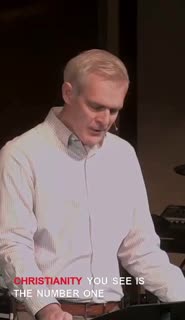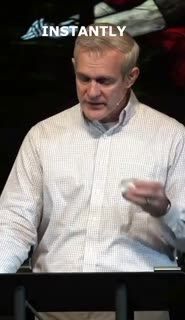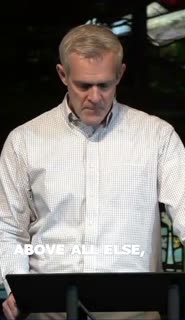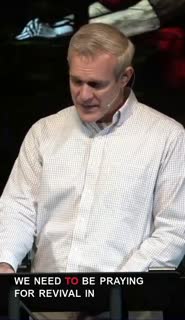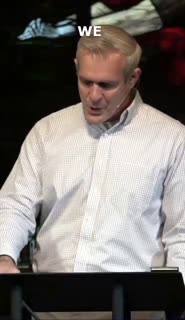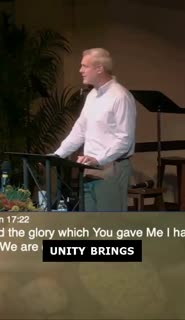Unity in Prayer: Strengthening Faith Amid Persecution
Devotional
Sermon Summary
Bible Study Guide
Sermon Clips
1. "Today as we focus in on our sermon I want to call us to unity. We are finishing our series called Life on the Rock and the title of my sermon today is The Lord's Supper: A Call for Unity. I found that if there's one thing that unifies a body of believers like nothing else, it's prayer. Today is the 2024 International Day of Prayer for the Persecuted Church. I fear as we as American believers often get too caught up in our own selves that we don't think about praying for other believers around the world who objectively have it much harder than we do as Christians." ([00:00:03] (51 seconds)
)
2. "Christianity, you see, is the number one persecuted religion in the world today. Christians are being persecuted in some fashion in 145 countries around the world. Scholars say that there are about 195 countries in our world, so that means that Christians face persecution in almost 75 percent of all the countries in the world. The top three countries that persecute Christians are Afghanistan, North Korea, and Somalia. The continent with the most persecution, however, is Africa." ([00:01:39] (38 seconds)
)
3. "20 people were killed instantly and about 45 were injured. And yet, Open Doors Ministry reports that the church in Africa is among the fastest growing in the world. And across Nigeria, within sites of communities destroyed by violence, many new churches are springing up. A church strong, resilient, faith-filled, and determined. Elia Jati of Open Doors sums it up. In some areas of Nigeria, going to church is like traveling with a one-way ticket. There's no certainty or guarantee of coming back, people are still going to church." ([00:03:52] (46 seconds)
)
4. "I want to encourage you to go and vote on Tuesday. If you haven't voted already, make sure you go and vote. But what I think we need even more than voting Christians is praying Christians. This is why we're opening our door on Tuesday from seven o'clock in the morning to seven o'clock at night so that you can go vote and then you can come here and you can pray for the election, that you can pray for our country, that you can spend some time here in this very sanctuary, perhaps on your knees here at the altar, praying for our country, humbling yourself, repenting of sins and asking God to heal our land." ([00:06:07] (41 seconds)
)
5. "I want to clear up something that some of us have wondered about for quite some time. Christ is speaking symbolically. Christ is speaking symbolically. Our Catholic friends teach that the bread and the wine become the actual flesh and blood of Christ. This is called transubstantiation. They back this up with what Christ said in John 6, 53. Now, when you look at this verse and you read it, at first glance, it does seem like Christ is literally talking about his flesh and his blood. But when you go just a little bit further in John chapter 6 to verse 63, you see what Christ is really saying." ([00:12:15] (52 seconds)
)
6. "I think it's a great idea that we talk to others about our beliefs, especially about what we have in common, like communion, the gospel of Jesus. Speaking to others about what you believe actually helps you to understand what you believe. You believe better. This is what Peter meant when he said in 1 Peter 3:15, but sanctify the Lord God in your hearts and always be ready to give a defense to everyone who asks you a reason for the hope that is in you with meekness and in fear." ([00:18:06] (32 seconds)
)
7. "Above all else, remember that God is sovereign. He appoints our leaders, Romans 13, one. Let every soul be subject to the governing authorities, for there is no authority except from God, and the authorities that exist are appointed by God. As a believer understanding Romans 13, one, you don't need to worry about what happens on Tuesday. Amen? Our anxiety can be pushed away because God is in control. He appoints our leaders. We don't have to worry about it. Do your part and vote, and then leave the rest up to the Lord." ([00:22:14] (37 seconds)
)
8. "We need to be praying for revival in this country. We need to be praying that the church would rise up and spread the gospel like none other time in history, that we would go forth telling others about Jesus Christ so that our country can come back to its Christian principles. Pray for healing. Pray for unity and truthfulness. So Christ teaches unity through connection, unity through truth, and next he teaches unity through worship." ([00:24:23] (33 seconds)
)
9. "We have unity through connection. We have unity through truth. We have unity through worship. And fourthly, we have unity through salvation. Verse 31, then Jesus said to them, all of you will be made to stumble because of me this night, for it is written, I will strike the shepherd and the sheep of the flock will be scattered. You see, it didn't take long for the disciples to scatter. His sheep scattered pretty quickly." ([00:28:43] (25 seconds)
)
10. "Unity brings belief in Jesus. This is the point that Jesus was making here in verse 21. When Christians are unified in Christ, a disbelieving world starts to believe. We need unity so the world will believe in Jesus Christ. Furthermore, unity brings glory to God. Following verse 21, we see verse 22, that Jesus notes that we share in the glory. Christ. Our lives now reflect God's glory, thereby further glorifying him. So unity brings salvation to the world and unity brings glory to God." ([00:33:17] (43 seconds)
)
Ask a question about this sermon
)
2. "Christianity, you see, is the number one persecuted religion in the world today. Christians are being persecuted in some fashion in 145 countries around the world. Scholars say that there are about 195 countries in our world, so that means that Christians face persecution in almost 75 percent of all the countries in the world. The top three countries that persecute Christians are Afghanistan, North Korea, and Somalia. The continent with the most persecution, however, is Africa." ([00:01:39] (38 seconds)
)
3. "20 people were killed instantly and about 45 were injured. And yet, Open Doors Ministry reports that the church in Africa is among the fastest growing in the world. And across Nigeria, within sites of communities destroyed by violence, many new churches are springing up. A church strong, resilient, faith-filled, and determined. Elia Jati of Open Doors sums it up. In some areas of Nigeria, going to church is like traveling with a one-way ticket. There's no certainty or guarantee of coming back, people are still going to church." ([00:03:52] (46 seconds)
)
4. "I want to encourage you to go and vote on Tuesday. If you haven't voted already, make sure you go and vote. But what I think we need even more than voting Christians is praying Christians. This is why we're opening our door on Tuesday from seven o'clock in the morning to seven o'clock at night so that you can go vote and then you can come here and you can pray for the election, that you can pray for our country, that you can spend some time here in this very sanctuary, perhaps on your knees here at the altar, praying for our country, humbling yourself, repenting of sins and asking God to heal our land." ([00:06:07] (41 seconds)
)
5. "I want to clear up something that some of us have wondered about for quite some time. Christ is speaking symbolically. Christ is speaking symbolically. Our Catholic friends teach that the bread and the wine become the actual flesh and blood of Christ. This is called transubstantiation. They back this up with what Christ said in John 6, 53. Now, when you look at this verse and you read it, at first glance, it does seem like Christ is literally talking about his flesh and his blood. But when you go just a little bit further in John chapter 6 to verse 63, you see what Christ is really saying." ([00:12:15] (52 seconds)
)
6. "I think it's a great idea that we talk to others about our beliefs, especially about what we have in common, like communion, the gospel of Jesus. Speaking to others about what you believe actually helps you to understand what you believe. You believe better. This is what Peter meant when he said in 1 Peter 3:15, but sanctify the Lord God in your hearts and always be ready to give a defense to everyone who asks you a reason for the hope that is in you with meekness and in fear." ([00:18:06] (32 seconds)
)
7. "Above all else, remember that God is sovereign. He appoints our leaders, Romans 13, one. Let every soul be subject to the governing authorities, for there is no authority except from God, and the authorities that exist are appointed by God. As a believer understanding Romans 13, one, you don't need to worry about what happens on Tuesday. Amen? Our anxiety can be pushed away because God is in control. He appoints our leaders. We don't have to worry about it. Do your part and vote, and then leave the rest up to the Lord." ([00:22:14] (37 seconds)
)
8. "We need to be praying for revival in this country. We need to be praying that the church would rise up and spread the gospel like none other time in history, that we would go forth telling others about Jesus Christ so that our country can come back to its Christian principles. Pray for healing. Pray for unity and truthfulness. So Christ teaches unity through connection, unity through truth, and next he teaches unity through worship." ([00:24:23] (33 seconds)
)
9. "We have unity through connection. We have unity through truth. We have unity through worship. And fourthly, we have unity through salvation. Verse 31, then Jesus said to them, all of you will be made to stumble because of me this night, for it is written, I will strike the shepherd and the sheep of the flock will be scattered. You see, it didn't take long for the disciples to scatter. His sheep scattered pretty quickly." ([00:28:43] (25 seconds)
)
10. "Unity brings belief in Jesus. This is the point that Jesus was making here in verse 21. When Christians are unified in Christ, a disbelieving world starts to believe. We need unity so the world will believe in Jesus Christ. Furthermore, unity brings glory to God. Following verse 21, we see verse 22, that Jesus notes that we share in the glory. Christ. Our lives now reflect God's glory, thereby further glorifying him. So unity brings salvation to the world and unity brings glory to God." ([00:33:17] (43 seconds)
)

